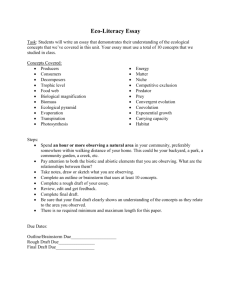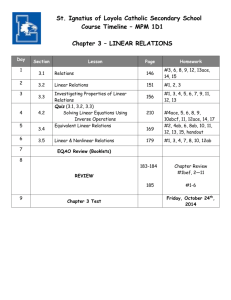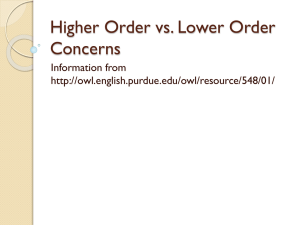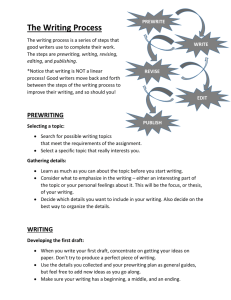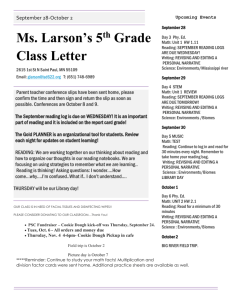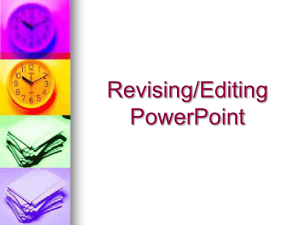COD Reid Sample Schedule
advertisement
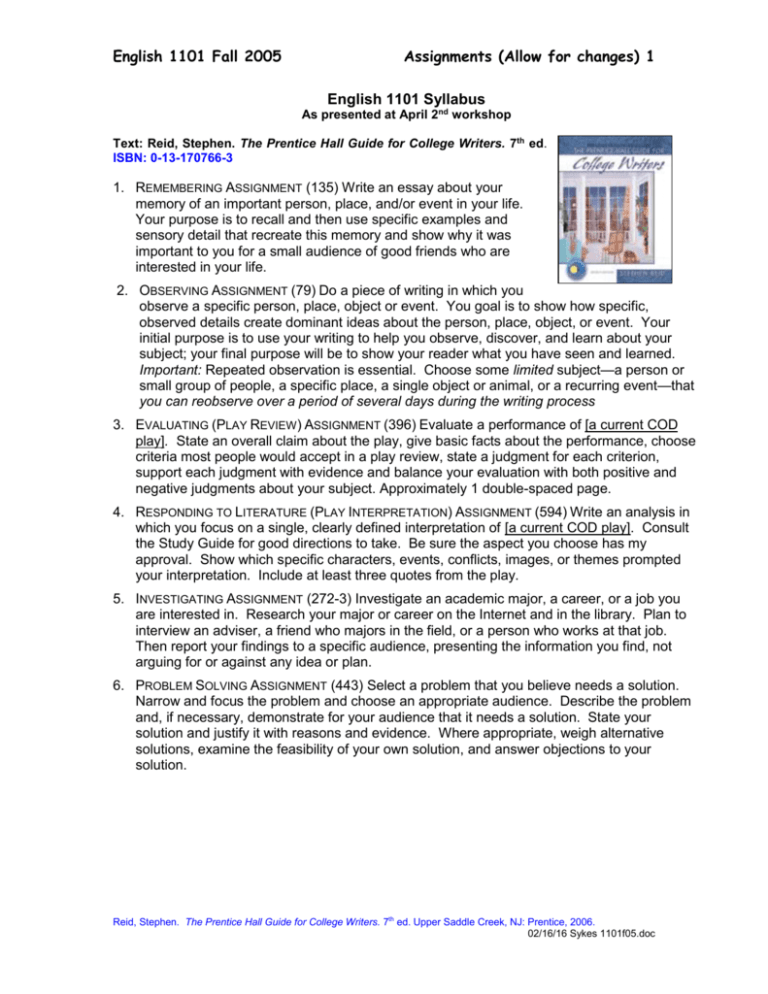
English 1101 Fall 2005 Assignments (Allow for changes) 1 English 1101 Syllabus As presented at April 2nd workshop Text: Reid, Stephen. The Prentice Hall Guide for College Writers. 7th ed. ISBN: 0-13-170766-3 1. REMEMBERING ASSIGNMENT (135) Write an essay about your memory of an important person, place, and/or event in your life. Your purpose is to recall and then use specific examples and sensory detail that recreate this memory and show why it was important to you for a small audience of good friends who are interested in your life. 2. OBSERVING ASSIGNMENT (79) Do a piece of writing in which you observe a specific person, place, object or event. You goal is to show how specific, observed details create dominant ideas about the person, place, object, or event. Your initial purpose is to use your writing to help you observe, discover, and learn about your subject; your final purpose will be to show your reader what you have seen and learned. Important: Repeated observation is essential. Choose some limited subject—a person or small group of people, a specific place, a single object or animal, or a recurring event—that you can reobserve over a period of several days during the writing process 3. EVALUATING (PLAY REVIEW) ASSIGNMENT (396) Evaluate a performance of [a current COD play]. State an overall claim about the play, give basic facts about the performance, choose criteria most people would accept in a play review, state a judgment for each criterion, support each judgment with evidence and balance your evaluation with both positive and negative judgments about your subject. Approximately 1 double-spaced page. 4. RESPONDING TO LITERATURE (PLAY INTERPRETATION) ASSIGNMENT (594) Write an analysis in which you focus on a single, clearly defined interpretation of [a current COD play]. Consult the Study Guide for good directions to take. Be sure the aspect you choose has my approval. Show which specific characters, events, conflicts, images, or themes prompted your interpretation. Include at least three quotes from the play. 5. INVESTIGATING ASSIGNMENT (272-3) Investigate an academic major, a career, or a job you are interested in. Research your major or career on the Internet and in the library. Plan to interview an adviser, a friend who majors in the field, or a person who works at that job. Then report your findings to a specific audience, presenting the information you find, not arguing for or against any idea or plan. 6. PROBLEM SOLVING ASSIGNMENT (443) Select a problem that you believe needs a solution. Narrow and focus the problem and choose an appropriate audience. Describe the problem and, if necessary, demonstrate for your audience that it needs a solution. State your solution and justify it with reasons and evidence. Where appropriate, weigh alternative solutions, examine the feasibility of your own solution, and answer objections to your solution. Reid, Stephen. The Prentice Hall Guide for College Writers. 7th ed. Upper Saddle Creek, NJ: Prentice, 2006. 02/16/16 Sykes 1101f05.doc English 1101 Fall 2005 Class Assignments (Allow for changes) 2 Homework Week 1 Syllabus REMEMBERING ASSIGNMENT 135 Introduce memoir essay as a genre. Have students read 1-2 pages of Helen Keller essay and identify features (work on task in groups). REMEMBERING: FINDING A TOPIC Class brainstorm topics focusing on events, people, places. How to shape and organize an essay based on memory. How do these kinds of essays begin and end? How do they create an impact on the reader? REMEMBERING: FINDING A TOPIC Read PHG Chapter 4, pages 104-112. Complete two of the “Warming Up” journal exercises on pp. 112-113, writing at least one full page in response to each. Read pages 135-143. Read the student work on pages 147-153. Choose two possible subjects for your memoir essay—see 135-136 REMEMBERING: COLLECTING INFORMATION Experiment with the three “Collecting” strategies described on pages 136-37. Try all three strategies for each of your topics. Read “Beauty: When the Other Dancer Is the Self,” by Alice Walker, PHG pp. 126-133 [personal essay]. Be prepared for an in-class assignment based on this reading and on questions 3-5 on pp. 134. Week 2 REMEMBERING: DRAFTING In-class assignment based on Walker essay. Draft-in-progress workshop Prepare for peer review; discuss evaluation criteria for this assignment. REMEMBERING: REVISING AND EDITING Introduce peer review with sample student essay. Peer review REMEMBERING: ORGANIZING/ DRAFTING Select your memoir subject and narrow/ focus as much as you need to. Write a plan for your essay—this could be an outline, but it doesn’t have to be. Work with the suggestions under “Organizing,” pages 138-43. Going by your plan, write about a page (or about a third) of your first draft. Bring it to class (does not have to be typed, but should be readable by another student). Essay draft due. Typed, double-spaced, no more than four pages. Put your name on each page. Print your essay before class. Back up your file or disk. Bring disk to class. Reid, Stephen. The Prentice Hall Guide for College Writers. 7th ed. Upper Saddle Creek, NJ: Prentice, 2006. 02/16/16 Sykes 1101f05.doc English 1101 Fall 2005 Assignments (Allow for changes) 3 Week 3 Essay revision due Complete Postscript Writing in class. Debrief writing process successes and concerns. Read “Revising and Editing” on pp. 144-46 before Revising and Editing. Essay revision due OBSERVING ASSIGNMENT 79 OBSERVING: FINDING A TOPIC (79-81) Wolf or wild animal experiences shared by class 1 OBSERVING: COLLECTING INFORMATION Techniques for writing about observations—54-55 Class observation exercise (e.g. Journal #1, 60) OBSERVING: TOPIC & COLLECTING “Observing Wolves,” [personal essay] 6978, vocabulary & questions 1, 2, 4 OBSERVING: COLLECTING INFORMATION 1st set of observation notes for paper 81-83 Week 4 OBSERVING: COLLECTING INFORMATION Discuss “Observing Wolves” OBSERVING: ORGANIZING Dominant idea 55 Small group observation of unusual objects to discern function (Teacher’s ed. 57) Students share observation notes and search for focus. Organizing 83-88—Class makes visual maps of these organizational strategies Title, intro, conclusion 88-89 OBSERVING: COLLECTING INFORMATION 2nd set of focused observation notes 81-83 OBSERVING: ORGANIZING 2 maps for paper using different organizational strategies, for example, compare/contrast and narrative, or definition and classification OBSERVING: DRAFTING 1st Version Observing Paper, 2 copies Week 5 OBSERVING: REVISING AND EDITING Peer response 91 and mini-conferences ASSIGNMENT FOR EVALUATING 396 EVALUATING: FINDING A TOPIC Techniques for Writing Evaluations 363, Evaluating Performances 370 Introduction to plays using video from Literary Visions series Discussion of differences between plays and movies 1 OBSERVING: REVISING AND EDITING Revision 90-93, Postscript on the Writing Process 93 Manuscript format 617 EVALUATING: COLLECTING INFORMATION “Peter Jackson’s Sorcery” (Review of Lord of the Rings movie adaptation) 371-374 Disney’s Wolves is based on this story—a short clip might introduce topic and reading assignment Reid, Stephen. The Prentice Hall Guide for College Writers. 7th ed. Upper Saddle Creek, NJ: Prentice, 2006. 02/16/16 Sykes 1101f05.doc English 1101 Fall 2005 Assignments (Allow for changes) 4 Week 6 Observing Portfolio due OBSERVING: REVISING AND EDITING Grammar correction EVALUATING: ORGANIZING Discussion of “Peter Jackson’s Sorcery” emphasizing criteria and judgments included in a play review EVALUATING: COLLECTING INFORMATION Brainstorm questions for production member(s) of Buffalo Theatre Ensemble [who will visit your class if you ask them.] Questions and answers from BTE—either before the first performance, or on a class visit EVALUATING: COLLECTING INFORMATION Report on the talk by the BTE. Include names, comments about set, lighting, sound, the question you asked and their answer and anything else of interest or helpful for your papers LITERATURE & EVALUATING: COLLECTING View play and save program and ticket stub Read script 2(literature)—answer study questions provided by Buffalo Theatre Ensemble Week 7 EVALUATING: ORGANIZING Techniques for Writing Evaluations 363 Analysis of “Peter Jackson’s Sorcery” for organizational and stylistic features of reviews In-class writing of review introduction LITERATURE ASSIGNMENT 594 LITERATURE: FINDING A TOPIC Discussion of study questions to understand play and generate ideas for writing topics Topic mini-conferences LITERATURE: ORGANIZING Class analysis of “A Singular Perpetuation” 603605 (academic writing) for features of academic writing that students should use in their own writing Using quotations, works cited 655-673; quotations from drama (MLA Manual) DRAFTING, REVISING AND EDITING 405-406 Write Play Review for next class LITERATURE: COLLECTING INFORMATION Script annotation LITERATURE: DRAFTING 1st Version of Play Interpretation with 2 hard copies Week 8 Play Review due LITERATURE: REVISING AND EDITING Peer response and mini conferences INVESTIGATING ASSIGNMENT 272-3 INVESTIGATING: FINDING A TOPIc “Why I Am Choosing _____ as My Career” free write & class sharing Key investigative question Mini conferences (set up office appointments for those who need and/or want them) INVESTIGATING: COLLECTING INFORMATION Interviewing 279-280 Practice interview--Journals # 1 & 7 241-242 INVESTIGATING: COLLECTING INFORMATION “Plotting a Net Gain” (journalism) 245-251, Questions 1 & 3 Interview someone with first-hand knowledge of your career Formulate questions, set up interviews 244-247 Report on interview 2 If you decide to use the assignment with a play as I have done, you can require students to purchase the script. Check on Amazon. Dramatists Play Service publishes plays for @ $7.00. Reid, Stephen. The Prentice Hall Guide for College Writers. 7th ed. Upper Saddle Creek, NJ: Prentice, 2006. 02/16/16 Sykes 1101f05.doc English 1101 Fall 2005 Assignments (Allow for changes) 5 Week 9 Play Interpretation Portfolio due REVISING AND EDITING Grammar corrections Interview report due INVESTIGATING: COLLECTING INFORMATION Quotation, summary, citation 277-279; 655-673 Library Orientation with a focus on career information INVESTIGATING: COLLECTING INFORMATION Make photocopies of 2-3 library sources that answer your investigative question 247-249 Source Report #1 Write a journal reporting on what you found in your best source. Incorporate at least 2 quotations and 2 summaries from the source, and end with a Work Cited page. 249 Week 10 Source Report #1 due INVESTIGATING: ORGANIZING Investigating techniques 227 Introduction, lead in, conclusion, title 284-285. Bring in professional samples of classic leads (pages 340-346) and “catchy” titles. Have students identify strategies and practice their own. Mini conferences Paraphrasing Works Cited 629 INVESTIGATING: COLLECTING INFORMATION Source Report #2 Write a journal reporting on what you found in a second source. Incorporate at least 2 paraphrases from the source, and end with a Work Cited page. INVESTIGATING: DRAFTING 1st version of Investigating paper Week 11 Source Report #2 due INVESTIGATING: REVISING AND EDITING Peer response and mini conferences 286 Documentation 655-673 INVESTIGATING: REVISING AND EDITING Revision 287; Postscript on the Writing Process 287-288 Week 12 Investigating Portfolio due REVISING AND EDITING Grammar corrections PROBLEM SOLVING ASSIGNMENT 4433 PROBLEM SOLVING: FINDING A TOPIc 420-426 Analyze the softball visual 428; do some journal exercises from pages 427-8 and read the sample guidelines and accompanying essays for “Demonstrating That a Problem Exists” and “Proposing a Solution and Convincing Your Readers” 424-426 PROBLEM SOLVING: TOPIC AND COLLECTING Brainstorm ideas for topics and make notes about identifying the problem and possible solutions and about their audience and context of their problem Mini conferences 3 PROBLEM SOLVING: DRAFTING Write a first draft of your essay PROBLEM SOLVING: REVISING Read one of the student or professional essays by Berube 429 (journalism), Tannen 436, Busch 456 (journalism), or Cook 462(academic) This section of the syllabus was contributed by the textbook author, Stephen Reid Reid, Stephen. The Prentice Hall Guide for College Writers. 7th ed. Upper Saddle Creek, NJ: Prentice, 2006. 02/16/16 Sykes 1101f05.doc English 1101 Fall 2005 Assignments (Allow for changes) 6 Week 13 PROBLEM SOLVING: ORGANIZING AND REVISING Students compare their drafts and plans to the assigned essay. How are these essays organized? Where do the writers identify the problem? Where do they propose their solution? Who is the audience and what is the context for their solution? After students read the professional and/or student essays they can look at their own drafts and begin to revise. PROBLEM SOLVING: REVISING Revision workshop 452, Guidelines for Revising 453 PROBLEM SOLVING: REVISING AND EDITING Revise draft Week 14 PROBLEM SOLVING: REVISING AND EDITING Students bring revised draft, do proofreading and editing in class, and write a postscript 455. Then they hand in the paper Week 15 Conferences and end-of-quarter activities I shall live badly if I do not write, and I shall write badly if I do not live. FRANÇOISE SAGAN Reid, Stephen. The Prentice Hall Guide for College Writers. 7th ed. Upper Saddle Creek, NJ: Prentice, 2006. 02/16/16 Sykes 1101f05.doc
